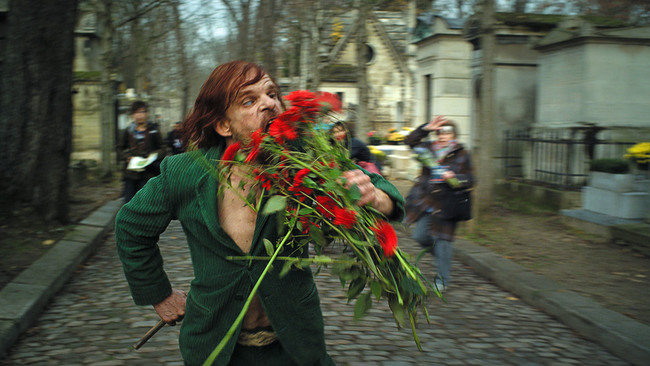Goings On: Champetier, Martel, and More

Lucrecia Martel, whose Zama is part of the festival’s Main Slate, will be at the Pratt Film/Video Department this evening to take part in a discussion of her work with professors Jim Finn and Matías Piñeiro.
“The lingering exoticism and externally-imposed mystery of ‘Chinatown-as-concept,’ explored this month in Metrograph’s Imaginary Chinatown series, boasts a line-up of recent and established classics that examine American cinema’s decades-long fixation with the iconc neighborhood,” writes Caroline Golum at Screen Slate. “Among the older entries is Raoul Walsh’s The Bowery [1933], a pre-Code curio that, for all its zeitgeisty insensitivity, makes for a compelling patchwork tale of late-19th century New York.” Screens Sunday afternoon.
Cinematographer Caroline Champetier: Shaping the Light, a series at the French Institute Alliance Française, rolls on this evening with a screening of Arnaud Desplechin’s La Sentinelle (1992). “An unsung hero of French cinema whose career encompasses four decades, Caroline Champetier gets her hard-earned due in this retrospective,” writes Peter Labuza in the Village Voice.
And from FIAF: “A student of William Lubtchantsky, she has worked with generations of pioneering filmmakers from Jean-Luc Godard and Jacques Rivette to Chantal Akerman, Arnaud Desplechin, and Léos Carax.” On October 24, Champetier will take part in Q&As following the screenings of Anne Fontaine’s Les innocentes (2016) and Carax’s Holy Motors (2012; image above).
Los Angeles. Writing for the Hollywood Reporter,Jordan Cronk looks ahead to October’s highlights: Pacific Standard Time: LA/LA; a double feature from Kino Slang, Jean Renoir’s The Southerner (1945) and Luis Bunuel’s The Young One (1960); Claudio Caldini’s “rare 8 mm films”; classic Universal horror at LACMA; Hirokazu Kore-eda: Cinema from the Outside In at the Billy Wilder; and Landmarks of Soviet Cinema at the Aero Theatre in Santa Monica.
On Monday, Laura Poitras will be at REDCAT to present a series of short films, Death of a Prisoner (2013), Project X (2016, with Henrik Moltke), O’Say Can You See (Afghanistan) (2016), and November 20, 2004 (work-in-progress), “with footage that put her on a U.S. government watchlist.”
John Boorman’s Excalibur (1981) screens tomorrow and Thursday at the New Beverly and Garret Mathany tells the story of its making.
Bay Area. “The Mill Valley Film Festival (MVFF) turns forty this year and will celebrate that milestone with a program that could be its biggest and best yet,” writes Michael Hawley at the top of his preview. “Running from October 5 to 15, MVFF40 boasts yet another spectacular docket of filmmakers (Richard Linklater, Todd Haynes, Dee Rees, Sean Baker, Greta Gerwig) and actors (Holly Hunter, Andrew Garfield, Sean Penn, Kristin Scott Thomas) ready to make a Northern California pilgrimage to promote their autumn Awards Season projects. In total, the line-up encompasses nearly 120 features and ninety shorts from fifty-two countries—an impressive forty-three percent of which were helmed by women filmmakers.”
Cambridge.Cinema That Shook the World, a series presented by the Harvard Film Archive in conjunction with the Houghton Library exhibition The Russian Revolution: Actors and Witnesses in Harvard Library Collections (on view through December 21), opens Saturday and runs through October 15.
Then, from Sunday through October 29, the HFA presents It’s My Life We're Talking About! The Films of Danny Lyon. Will VanKoughnett: “Much of the work included in this program is concerned with the status of illegal immigrants and other marginalized peoples, and it is with the consequences of adopting an official policy of hate and insecurity about identity and otherness in mind that the Harvard Film Archive is honored to welcome Danny Lyon in person on two nights to present and discuss this selection of beautiful and urgent cinema.”
Austin. The Film Society’s series Art Horror runs from Friday through October 28.
Orcas Island. “A seaplane from Seattle gets you there in forty minutes,” notes Charles Mudede in the Stranger. “The drive (which includes a ferry ride) takes about three hours if the traffic is merciful. Because the place is outside of my comfort zone, I have never found a good reason to visit it. This year, however, I have. It's the 4th Annual Orcas Island Film Festival (Oct 6-9). And I'm not going there simply because there's a festival (there are plenty of festivals in other rural or remote places), but for the specific films in this year's festival. They are the crème de la crème of the first-tier festival circuit.”
Toronto. “In many ways, modern Filipino cinema was born in opposition to the dictatorial regime of President Ferdinand Marcos, who ruled the country with an iron fist after instituting martial law in 1972.” In his brief preview of the TIFF Cinematheque series People Have the Power: Resistance in Filipino Cinema, running from Thursday through November 4, Steve Gravestock focuses on Lino Brocka and Lav Diaz.
Pordenone. On her third day at Le Giornate del Cinema Muto, the Pordenone Silent Film Festival, Pamela Hutchinson saw Louise Brooks playing twins before catching comedies from the Nasty Women strand.
For news and items of interest throughout the day, every day, follow @CriterionDaily.



